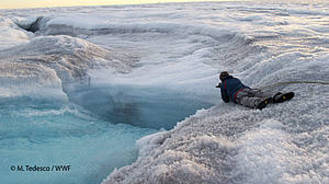New melt record for Greenland ice sheet
New research shows that 2010 set new records for the melting of the Greenland Ice Sheet, expected to be a major contributor to projected sea level rises in coming decades.
|
|
|
Researchers on safety ropes edge towards a cascade pouring into a newly opened crack on the Greenland ice sheet. [WWF] |
"This past melt season was exceptional, with melting in some areas stretching up to 50 days longer than average," said Dr. Marco Tedesco, Director of the Cryosphere Processes Laboratory at the City College of New York (CCNY – CUNY), who is leading a project studying variables that affect ice sheet melting.
"Melting in 2010 started exceptionally early at the end of April and ended quite late in mid- September."
The study, with different aspects sponsored by WWF, the US National Science Foundation (NSF) and NASA, examined surface temperature anomalies over the Greenland ice sheet surface, as well as estimates of surface melting from satellite data, ground observations and models.
In an article published today in Environmental Research Letters, Dr Tedesco and co-authors note that in 2010, summer temperatures up to three degrees C above the average were combined with reduced snowfall.
The capital of Greenland, Nuuk, had the warmest spring and summer since records began in 1873.
Bare ice was exposed earlier than the average and longer than previous years, contributing to the extreme record.
"Bare ice is much darker than snow and absorbs more solar radiation," said Dr Tedesco.
"Other ice melting feedback loops that we are examining include the impact of lakes on the glacial surface, of dust and soot deposited over the ice sheet and how surface meltwater affects the flow of the ice toward the ocean."
WWF climate specialist Dr. Martin Sommerkorn said "Sea level rise is expected to top one metre by 2100, largely due to melting from ice sheets. And it will not stop there – the longer we take to limit greenhouse gas production, the more melting and water level rise will continue."
 0
0 







